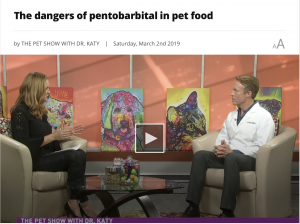 Commercially-available pet foods and treats are recalled for a variety of reasons with some reasons having major health implications for our companion animals. One shocking reason for recall is the discovery of the drug Pentobarbital.
Commercially-available pet foods and treats are recalled for a variety of reasons with some reasons having major health implications for our companion animals. One shocking reason for recall is the discovery of the drug Pentobarbital. In 2017 a family of five dogs in one household started showing sudden-onset neurologic signs shortly after consuming pentobarbital-contaminated canned dog food. Three dogs recovered after receiving appropriate veterinary treatment. One dog requires ongoing treatment with seizure medication. One dog was euthanized due to neurologic signs and the stomach contents were confirmed to contain the drug. The pet owner’s and retailer’s cans of food were similarly determined to have pentobarbital and the food was recalled by the Food and Drug Administration (FDA).
What is Pentobarbital?
Pentobarbital is a barbiturate anesthetic (i.e. barbiturate), which has uses both in human and veterinary medicine as a sedative.
Pentobarbital is most commonly used in veterinary medicine when performing euthanasia, as only small amounts are needed to severely suppress breathing, heart rate, and blood pressure which ultimately causes lack of normal oxygen and nutrient delivery to vital organs (brain, heart, lungs, kidneys, liver, etc.), organ system malfunction, and death.
Pentobarbital is chemically related to phenobarbital, which is a commonly used anti-convulsant drug that is used to help control seizures in both dogs and cats.
Pentobarbital should definitely not be included in pet food or treats.
How did Pentobarbital entry the pet food chain?
Pentobarbital most likely entered the pool of ingredients used to create pet foods due to the inadvertent inclusion of parts of animals that were euthanized with the drug.
Up to now, only foods containing beef are being recalled and laboratory testing of the foods has confirmed only bovine DNA. Therefore in this circumstance, cows were euthanized with pentobarbital then rendered for use in edible products for pets.
Pentobarbital has previously been detected in pet foods, as in the 1990s it was detected in small amounts that were reported to not be significant enough to sicken pets. The source was reported to be cattle and horses euthanized with pentobarbital.
What can happen if your pet consumes Pentobarbital in food or treats?
If your pet consumes pentobarbital in food or treats there are a variety of adverse and potentially life-threatening health responses that can occur. Larger volumes of pentobarbital will lead to more severe clinical signs, including:
- Ptyalism (salivation)
- Emesis (vomiting)
- Stool changes (soft to liquid stools, blood, mucus, urgency, explosive nature, etc.)
- Hyporexia (decreased appetite)
- Lethargy/depression
- Neurologic abnormalities (tremor, seizure, vocalization, unusual eye movements)
- Ataxia (difficulty walking)
- Collapse
- Coma
- Death
- Other
If your pet shows any of the above or other signs of illness after consuming foods or treats immediately call your veterinarian or a local veterinary emergency hospital.
How can you keep your pet safe from Pentobarbital exposure?
Stay aware of pet food and treat recalls by frequently visiting the FDA’s Recalls & Withdrawals. Besides pentobarbital, some of the reasons consumable products for animals are recalled include bacterial contamination (Listeria, Salmonella, etc.), the inclusion of metal or plastic, decreases or increases in vitamin and mineral content, elevations in non-protein nitrogen, and others.
Sign up for email delivery of Truth About Pet Food blog, as Susan Thixton always keeps owners abreast of the latest pet food and treat recalls.
If you suspect your pet may have suffered health consequences after eating a commercially-available food or treat you can Report a Pet Food Complaint to the FDA.
Feed your pets foods and treats made from human-grade ingredients instead of rendered, feed-grade ingredients like meals, by-product meals, etc. Human-grade food products do not contain rendered ingredients like feed-grade ingredients used in most commercially-available pet foods and treats.
I had the opportunity to discuss this important health issue on the ABC7 WJLA program The Pet Show with Dr. Katy. See The Dangers of Pentobarbital in Pet Food.
Click the above link to watch the video and share it with your fellow pet aficionados. Feel free to contribute your perspective in the Comments section.
 Dr. Patrick Mahaney
Dr. Patrick Mahaney
Please leave your constructive perspective in the below Comments section and communicate with me and follow my adventures in veterinary medicine and life via Instagram (@PatrickMahaney), Twitter (@PatrickMahaney), and Facebook (Patrick Mahaney: Veterinarian Acupuncture Pain Management for Your Pets).
Copyright of this article (2019) is owned by Dr. Patrick Mahaney, Veterinarian, Certified Veterinary Acupuncturist and Certified Veterinary Journalist. Republishing any portion of this article must first be authorized by Dr. Patrick Mahaney. Requests for republishing must be approved by Dr. Patrick Mahaney and received in written format.
